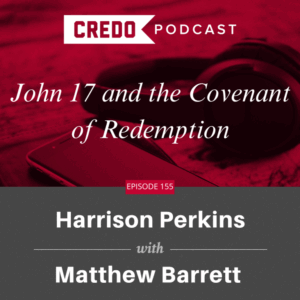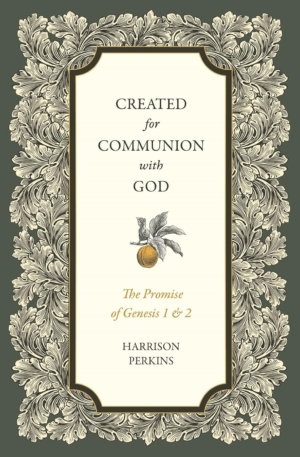You know Dr Harrison Perkins as one of the co-hosts of the Heidelcast Superfriends podcast on Saturdays. He is the author of a recent and important book on Reformed Covenant Theology and a widely published authority on the history of Reformed theology. . . . Continue reading →
Covenant of Grace
Review: Created For Communion With God: The Promise Of Genesis 1–2 By Harrison Perkins
As a Presbyterian minister, I have attended many Presbytery meetings where candidates for licensure or ordination are asked various questions touching on the Bible, theology, church government, and their commitment to the church’s confessional teaching. Inevitably, one question that is almost always . . . Continue reading →
New Online: Covenant, Justification, And Pastoral Ministry As A PDF
Thanks to the support of donors like you, the Heidelberg Reformation Association is pleased to be able to publish online Covenant, Justification, and Pastoral Ministry. For about the last year, we have been publishing online the chapters of the CJPM serially. Now we . . . Continue reading →
Heidelcast: Superfriends Saturday: Was the Covenant of Grace Made with Christ or the Elect? | Should I Change Churches?
It’s a Superfriends Saturday on the Heidelcast! Continue reading →
Video: What’s the Difference Between Covenant Theology And Dispensationalism?
What are some of the differences between Covenant Theology and Dispensationalism? Why are there so many debates over Covenant Theology? Dr. Harrison Perkins joins Pastor Adriel Sanchez to discuss some of themes in his two recent books, Reformed Covenant Theology: A Systematic . . . Continue reading →
Hodge On The Baptists, The Romanists, The Limbus, And The Abrahamic Covenant
The Baptists, especially those of the time of the Reformation, do not hold the common doctrine on this subject. The Anabaptists not only spoke in very disparaging terms of the old economy and of the state of the Jews under that dispensation, . . . Continue reading →
It Was Christ All Along
The final layer is that Christ is the substance of the covenant of grace since He was always its Mediator…. Moreover, the New Testament explicitly designates Christ as the Savior who was active in the Old Testament. Harrison Perkins | Reformed Covenant . . . Continue reading →
Why Adriel Sanchez Changed His Mind About Infant Baptism
Pastor Adriel Sanchez shares his journey from credobaptist to paedobaptist. While our Baptist brothers and sisters disagree, Pastor Adriel shares how the more he studied the Bible, the more he came to believe that the scriptures don’t just allow for infant baptism, but necessitate it. Continue reading →
Audio: Chad Vegas On “The Bride Groom Of Blood”
At a lodging place on the way the LORD met him and sought to put him to death. Then Zipporah took a flint and cut off her son’s foreskin and touched Moses’ feet with it and said, “Surely you are a bridegroom of blood to me!” So he let him alone. It was then that she said, “A bridegroom of blood,” because of the circumcision (Ex 4:24–26 (ESV). Continue reading →
New: Resources On The Internal/External Distinction In The Covenant Of Grace
When God said to Abraham, “And I will establish my covenant between me and you and your children after you throughout their generations for an everlasting covenant, to be God to you and to your children after you” (Genesis 17:7) and “As . . . Continue reading →
Kuiper: Pentecost Reversed Babel
Both at Babel and at Jerusalem God supernaturally caused men to speak in various tongues. But the consequences differed radically. At Babel there was confusion and division. Men were scattered abroad on all the face of the earth. That was the beginning . . . Continue reading →
Kuiper: The Covenant Of Grace Includes Believers And Their Children
God has promised to be the God, not only of those who believe, but also of their seed, and that, hence, He is wont as a general rule to bestow saving grace on the children of believers. R. B. Kuiper | God . . . Continue reading →
New Resource Page: On The Internal/External Distinction In The Covenant Of Grace
When God said to Abraham, “And I will establish my covenant between me and you and your children after you throughout their generations for an everlasting covenant, to be God to you and to your children after you” (Genesis 17:7) and “As . . . Continue reading →
Boston: Baxter Turned The Gospel Into Law
As to the point of justification; no man is, nor can be justified by the law. It is true, the Neonomians or Baxterians, to wind in a righteousness of our own into the case of justification, do turn the gospel into a . . . Continue reading →
Boston: The Mosaic Covenant Was An Administration Of The Covenants Of Grace And Works
Wherefore I conceive the two covenants to have been both delivered on Mount Sinai to the Israelites. First, The covenant of grace made with Abraham, contained in the preface, repeated and promulgate there unto Israel, to be believed and embraced by faith, . . . Continue reading →
Erskine: The Order Of Assurance Matters Because Grace And Works Are Two Distinct Things
Before we proceed to the more particular consideration of the words, it is very much worthy of our notice, to observe the apostle’s order and method of doctrine, and how he knits the believer’s privilege and duty together. He would have the . . . Continue reading →
Boston: In The Covenant Of Grace We Are Not Sent Back To The Covenant Of Works
For Adam, by his sin, being become the child of wrath, and both in body and in soul subject to the curse, and seeing nothing due to him but the wrath and vengeance of God, was “afraid, and sought to hide himself . . . Continue reading →
The Covenant Before The Covenants
Those not well read in sixteenth- and seventeenth-century Reformed theology might be forgiven their ignorance of the covenant of redemption or for concluding that it is an arcane doctrine long abandoned. Continue reading →
Colquhoun: No Natural Knowledge Of The Gospel
The law is known partly by the light of nature (Rom. 2:14–15), but the gospel is known only by a revelation from heaven (Matt. 11:27). Man, though he is a fallen creature, has in some degree a natural knowledge of the law, . . . Continue reading →
Colquhoun: We Were Created Able To Obey
The law [as a covenant of works] regards us as creatures originally formed with sufficient ability to yield perfect obedience to it; and accordingly, it requires us to retain and exert that ability in performing perfectly all the duties that we owe . . . Continue reading →








